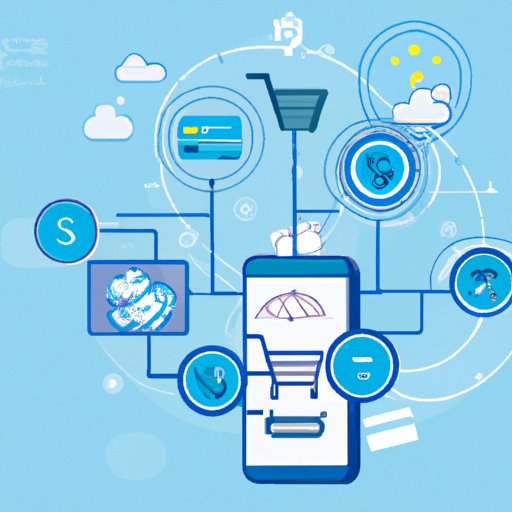Introduction
E-commerce technology is an umbrella term for the software and hardware used to facilitate purchases and sales over the internet. It enables customers to shop online and businesses to sell their products and services without having to meet face-to-face. E-commerce technology has revolutionized the way businesses interact with customers and has enabled them to expand their reach beyond physical locations.
The advantages of e-commerce technology are numerous. It has made it easier for businesses to connect with customers, increase their sales, reduce costs, and improve customer experience. In addition, it has enabled businesses to automate many processes, such as order processing and customer service.
Exploring Different Types of E-Commerce Technologies
There are several different types of e-commerce technologies available. Each type has its own unique features and benefits.
Online Shopping Carts
Online shopping carts are one of the most popular types of e-commerce technology. They enable customers to browse and purchase products or services from a website. Shopping carts allow customers to add items to their cart, view their subtotal, and check out securely. Many shopping carts also offer features such as discounts, coupons, and loyalty programs.
Payment Gateways
Payment gateways are another type of e-commerce technology that facilitates secure payments between buyers and sellers. Payment gateways provide a secure connection between merchants and payment processors, allowing customers to make payments without sharing their sensitive information with the merchant. Payment gateways usually come with additional features such as fraud protection, customer support, and analytics.
Digital Wallets
Digital wallets are becoming increasingly popular as a form of e-commerce technology. Digital wallets store credit card information and other personal data, allowing customers to make payments quickly and securely. Some digital wallets also offer additional features such as loyalty programs and rewards.
Mobile Commerce
Mobile commerce, or m-commerce, is a type of e-commerce technology that enables customers to purchase products or services from their mobile devices. Mobile commerce apps offer a convenient and secure way for customers to shop on the go. Many mobile commerce apps also offer features such as push notifications, customer reviews, and product recommendations.
Social Media Commerce
Social media commerce, or s-commerce, is a type of e-commerce technology that enables businesses to sell their products and services on social media platforms. Businesses can create dedicated pages on social media platforms such as Facebook and Instagram to promote their products, accept orders, and process payments.
How E-Commerce Technology Can Help Your Business Grow
E-commerce technology can help businesses grow in several ways. Here are some of the key benefits:
Increased Reach
E-commerce technology makes it possible for businesses to reach a global audience. With the right technology, businesses can easily set up an online store and start selling their products and services to customers around the world.
Improved Customer Experience
E-commerce technology makes it easier for businesses to provide a better customer experience. For example, online shopping carts make it easy for customers to browse and purchase products, and payment gateways make it easy for customers to make secure payments. Additionally, many e-commerce technologies offer features such as customer support, product recommendations, and loyalty programs.
Cost Savings
E-commerce technology can help businesses save money. By automating certain processes, businesses can reduce their labor costs and streamline their operations. Additionally, businesses can save money on marketing and advertising by leveraging the power of social media.
The Future of E-Commerce Technology
E-commerce technology is constantly evolving. Here are some of the technologies that are expected to shape the future of e-commerce:
Automation
Automation is expected to be a major trend in the future of e-commerce. Automation technologies such as robotic process automation (RPA) will enable businesses to automate routine tasks such as order processing and customer service, freeing up resources for more strategic initiatives.
AI and Machine Learning
Artificial intelligence (AI) and machine learning technologies are expected to play an important role in the future of e-commerce. AI-powered chatbots can provide personalized customer service, while machine learning algorithms can be used to recommend products to customers and detect fraud.
Augmented Reality
Augmented reality (AR) is expected to be a game-changer for e-commerce. AR technologies can be used to create immersive shopping experiences, allowing customers to virtually try on clothes or visualize how furniture would look in their home.
Security Considerations for E-Commerce Technology
When using e-commerce technology, it’s important to consider security. Here are some of the key security measures you should take:
Authentication
Authentication is a critical security measure for any e-commerce platform. Authentication ensures that only authorized users can access the system. This can be done through passwords, two-factor authentication, biometrics, and other methods.
Data Encryption
Data encryption is another important security measure. Encryption scrambles data so that it cannot be read by unauthorized parties. Data encryption should be used for all sensitive information, such as credit card numbers and customer data.
Secure Payment Processing
Secure payment processing is essential for any e-commerce business. Payment processors should use secure protocols such as TLS and SSL to protect customers’ sensitive information. Additionally, payment processors should have fraud detection systems in place to protect against fraudulent transactions.
Conclusion
E-commerce technology has revolutionized the way businesses interact with customers. It has enabled businesses to increase their reach, improve customer experience, and save money. Additionally, e-commerce technology offers a variety of features, such as automated order processing and customer service. However, it’s important to consider security when using e-commerce technologies. Authentication, data encryption, and secure payment processing are all essential to protecting customers’ data.
(Note: Is this article not meeting your expectations? Do you have knowledge or insights to share? Unlock new opportunities and expand your reach by joining our authors team. Click Registration to join us and share your expertise with our readers.)
